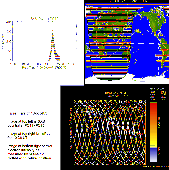
 |
Documentation > SXT Observation Notes > this page |
Image name: false_flare_971010.png (click image to enlarge)
Image size: 65.6180 KB (997x999)
Date submitted: 19-Oct-1997

Flare mode was triggered on 10-oct-97, at 19:38 UT; the flare mode lasted for ten minutes. There was no solar flare at the time. However, the count rate from SXS PC1 (upper left image) shows a sudden increase in counts at that precise time. The equipment responded correctly to enhanced count rates, but what is the source of the enhancement? Yohkoh was far from SAA, as shown in the plot at upper right. However, the period of time 19-20 UT was notable for enhanced auroral activity and elevated intensities of high-energy electrons. The plot at lower right shows the intensity of high-energy (>30 keV) electrons as measured by NOAA-12; the intensities are plotted on a color scale and with respect to the orbital position of NOAA-12. In this color scale, bright red indicates a current sensor response at least 10 times the last year's average. In particular, note the bright red streak on the extreme right of the plot, as NOAA-12 was southbound from the northeast to the soutwest, east of Japan. Along this track, at about 19:06 UT, NOAA-12 was observing intensities of >30 keV electrons that were about 30-40 times higher than the long term average intensities. The >100 keV channel (not plotted) similarly had intensities more than a factor of 3 above nominal. Although NOAA-12 flies higher than Yohkoh (820 km, compared to Yohkoh's 600 km), we suspect that bremsstrahlung from these electrons on the spacecraft could have been intense enough to trigger the flare mode. According to Dave Evans of the NOAA Space Environment Lab, these kinds of transient low-latitude electron flux enhancements are not too common, though Evans feels they are (i) most probable in the Pacific, and (ii) most probable in the dawn (local time) sector. Our false flare event has both these charateristics. For a further description see the SXT status report of 20-oct-97. D.McKenzie, 19-oct-97 NOAA-12 data and analysis courtesy of Dave Evans.